The Innovation Village Mbarara: One Year Of Accelerating Entrepreneurship
05 Jul
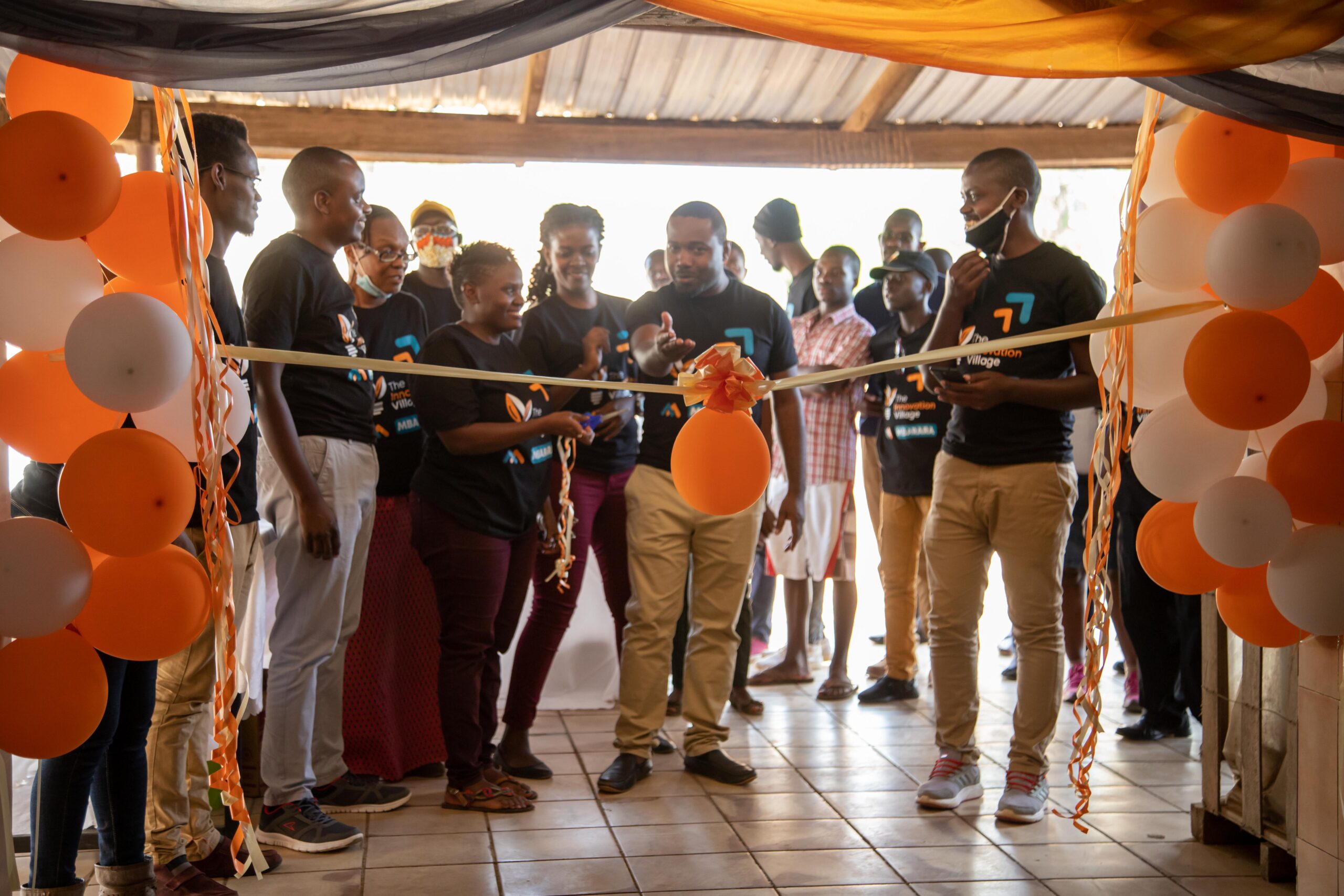
The story of The Innovation Village Mbarara begins in an unconventional way. It is the quintessential story of a rose that grew through the concrete given the circumstances of 2020, a year that is marked by an unprecedented havoc-wrecking pandemic on individuals and communities.
The story of Mbarara is best told first, through Anthea Ankunda, who was the pioneer community member of Mbarara and whose efforts have been crucial to the growth of The Innovation Village Mbarara to date.
Standing along Bushenyi road, opposite the Rwizi Arch hotel is a building adorned in bright colors, surrounded by a well-kept green lawn with a large sign reading, “The Innovation Village.”
The building has a colorful history, having previously been a dairy named Country Taste and before that, a popular nightclub in Mbarara beloved of its patrons as Sabena.
When Ankunda was put on the organizing team, three weeks before the activation of this innovation center, reporting to the scene of the community was something that prompted the question, “what have I got myself into?”
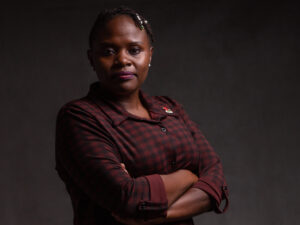
The sight before her, would draw the same expression from anyone.
Through Ankunda’s eyes, the site chosen to build The Innovation Village consisted of an abandoned plot of land, with a crumbling building that served as a dairy processing facility. The place then served as some form of scrap yard, with decommissioned cars and various old rusty contraptions that served as the milk processing plant.
All this sat amidst an overgrown lawn that qualified to be termed a wild bush. Its grass stood at an intimidating length and served as a habitat for stray dogs and families of rodents.
At the time, the plan was to activate the place in a space of one month and get it ready to begin hosting entrepreneurs. It was post lockdown and the city was just rising from the lockdown slumber to rebuild itself. The threat of COVID-19 still loomed in the air and it was a bit difficult to get people to dream again after the loss of lives, businesses and dreams.
Having been a resident of Mbarara for a while and part of many communities, Ankunda says that her networks came in handy in finding the team to revamp the place in time for activation.
A week of good scrubbing and refurbishing, and Ankunda and her team had the place ready to host 50 people at the community for the week of activation and around 100 participating both online and through radio programs.
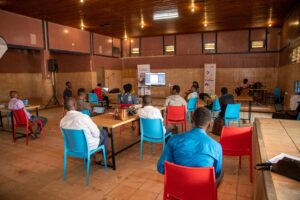
Dubbed as the Game changers roadshow, it was a week packed with a series of activities that saw 100 people participate online and physically in the activation week. A remarkable number gave the times of the lockdown. The crowd consisted of young entrepreneurs who participated in sessions on Design, Legal Training, Panel discussions, and a storytelling workshop. On the last day of the activation week, 14 entrepreneurs took to the floor to pitch their business ideas to a panel of seasoned entrepreneurs and mentors that encouraged them and sighted gaps that needed to be addressed.
Many brilliant ideas flowed during the pitch sessions especially from young university students from Bishop Stuart University in Mbarara. There were innovations like briquettes with mosquito repellent, nutrition for farm animals, shaving cream from lemons, a dance group and so many more being pitched.
One of the outstanding entrepreneurs discovered during the community outreach at the activation was a young woman, Asiyat Gamba, founder of the Lugazi youth training and skilling group. This is a group of young people who make crafts in leather with their flagship product being sturdy leather sandals.
At this first anniversary of The Innovation Village, Gamba reminisces about the particular period in which The Village came to Mbarara.
“It was a lockdown just like this one, we were under a lot of pressure, with arrears in rent because of the lack of sufficient capital coming into the business. The Innovation Village came and held our hand during a very difficult time. It supported us to remain on our feet by providing us funding that enabled us to pay our rent debts and keep our shop. The anniversary finds us in another lockdown. Unlike the last time, we have no fear. We know that as a community of entrepreneurs at the Village in Mbarara, we are going to emerge out of this and work actively again. Because we are together, we will survive the challenges from this lockdown once more. I am so grateful that the community opened up space here because as women, as entrepreneurs and as young people, it has been everything for us at a difficult time,” Gamba says.
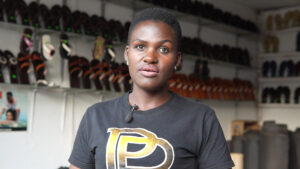
Ankunda says that after the activation, the work of building a community had only begun. With more refurbishing, it took them until September, to get their first resident.
The first resident of The Innovation Village was D90, a media house doing photography and videography. It is founded and run by Miles Ariho. Having moved into the offices in September 2020, Ariho has to say this about his experience as a member.
“I found the environment was conducive for a creative. It enables one to work uninterrupted in a serene environment especially with the aid of amenities like fast wifi,” he says.
Ariho further explains what their experience has been since moving in. “It has been a fruitful experience, we have met new people and made new connections. I have been able to work with a couple of people that have crossed my path here at The Village, including having The Innovation Village as a client.”

Since September, The Innovation Village team has managed to build a community of 800 people including but not limited to, university students and entrepreneurs in the field of agriculture, creative arts and technology.
This came as a result of what Ankunda says was a full-time ambassadorship about what The Innovation Village did and the necessity of building a vibrant entrepreneurship ecosystem in the heart of a young city.
The team at The Innovation Village says that while the entrepreneurial and innovative scene is vibrant, there is a slow progression towards industrialisation and technology. However, this is something that the community will gradually adopt. This past year the efforts have been placed into unlocking the potential among tech innovators to find solutions in agriculture and crafts.
The Innovation Village Regional Manager, Western region, Elaine Ayebazibwe also expressed gratitude and marvels at how far they have come in one year.
Ayebazibwe says, “ The past one year has mostly been a learning curve for entrepreneurs in the community and the regional team at large. At the mark of one year, we celebrate the members that chose to embark on this journey with us that has seen tremendous growth as most have moved from ideation to startup stage.”
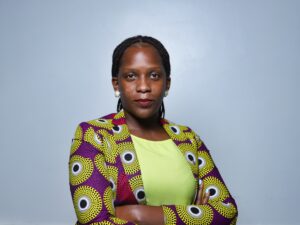
She is positive that with concerted team efforts through tailored programs, the only way from here is forward and upwards. Given the track record of the past year, the region and the country at large should expect more startups launched, more innovations cropping up in the areas of agriculture and tourism. Also top of mind is a resilient and dynamic community of entrepreneurs creating a sweeping change in their community.
In addition to Ayebazibwe’s sentiments, the Programs Lead at The Innovation Village, Kristine Owiny says that the Mbarara community has grown immensely over the last year.
“We are so proud of the progress made and the value that the team is bringing to the region,” Owiny says before adding that since piloting the Virtual Factory Network, they have been able to engage cottage entrepreneurs and deeply understand their needs.
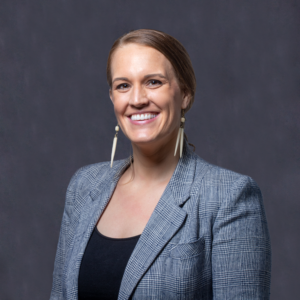
Owiny further says that The Innovation Village remains committed to providing opportunities for youth in dignified and sustainable work through Mastercard Foundation’s Young Africa Works Strategy. On behalf of The Innovation Village, Owiny pledges to continue engagement with the regional team to ensure that they are providing valuable support and offerings to young people in various sectors especially in the western region.
Related Post
Recent Posts


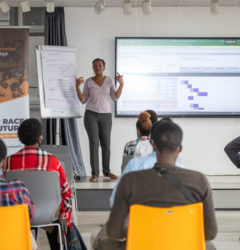
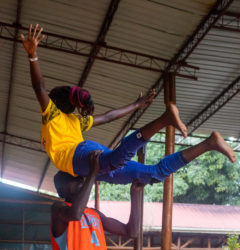
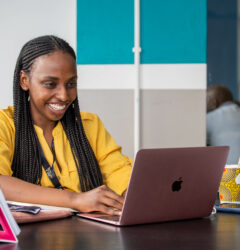





Recent Comments